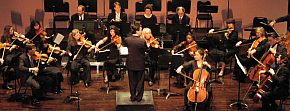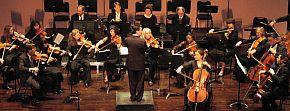
The first half of the evening is a study on concertos for two instruments, beginning with two debut artists, cellists Isabel Lau and Benjamin Luo performing Vivaldi’s Double Cello Concerto in G Minor. Isabel, a freshman at Mercy High School in San Francisco, began studying at age 6 with Irene Sharp. At 14, she already sports an impressive list of accomplishments. She’s a former coprincipal of the Peninsula Youth Orchestra and regularly attends prestigious summer festivals such as Music at Menlo and the Yehudi Menuhin Festival. Isabel also plays chamber music in the Prep Division of the San Francisco Conservatory of Music and was a semifinalist in 2009 for the ASTA National Solo Competition.
Benjamin, a 15-year-old sophomore at St. Francis High School, also studies with Sharp and is equally gifted. He is currently in the California Youth Symphony Senior Orchestra, and has attended the California Summer Music camp, among others. It’s a rare treat to hear two such talented young cellists on stage together.
Next we’ll hear the Honegger Concerto da Camera with seasoned SFCO principals Tod Brody on flute and Peter Lemberg on English horn. Not a widely played work, it remains a charming and accessible example of the composer’s modern style. Arthur Honegger, of the famed French group of composers called “Les Six,” was commissioned in early 1948 by Elizabeth Sprague-Coolidge to write the “Chamber Concerto” — a colorful and dynamic piece that’s possibly deserving of more attention today.
The SFCO commissioned Gloria Justen to write Not Created Nor Destroyed, for solo violin, solo violoncello, and string orchestra. Justen, a bicoastal violinist and composer, is certainly going places. Of the hip, young “composer-as-performer” ilk, as well as a master of the violin classics, she has a few surprises up her sleeve. Justen came to composing through her ability to improvise in many styles, and writes music for acoustic instruments, as well as digital sound collages incorporating electronics, field recordings, and surround sound concepts. Her first CD of original music, Four-Stringed Voice, is a collection of pieces for solo violin. As a performer, Justen tours with the Philip Glass Ensemble and is concertmaster of the Chamber Orchestra of Philadelphia.
Justen writes of the new piece: “Not Created or Destroyed, for Solo Violin, Solo Cello, and String Orchestra ... refers to how energy in the universe does not appear or disappear, but changes form, structuring into matter and then disintegrating again into pure energy. The music explores certain interval relationships, meaning how two notes resonate with each other, which has a physical wave pattern and an emotional impact. For example, in the first movement, ‘Radiance,’ the perfect fifth is a building block. ... The second movement, ‘Breath,’ is more sorrowful, in a manner similar to Shostakovich’s music. Frozen dissonant chords (intervals of sevenths and ninths) form a backdrop for the duet of the soloists, with the viola part as a ‘breathing’ presence. The interval of the sixth is played by the soloists first as delicate ‘droplets’ and later as an inexorable ‘cascade.’ The third movement, ‘Pulses,’ is a quick and whirling piece that varies between a constantly rising and falling ‘stream,’ resonant plucked chords, and repeated static patterns.”
The concert finishes with Haydn’s Symphony No. 77 in B-flat Major, from his Esterházy years. Unlike other of his symphonies with titles such as the “Surprise,” the “Farewell,” or the “London,” this symphony was not named, so the SFCO held a naming contest at its Freight and Salvage concert in Berkeley last week. The winning title, by SFCO member Don Smiegiel, was “The Freight and Salvation.” (It’s not clear whether that will make it into the program notes.) The SFCO has made it a point to introduce such fun contests, including the opportunity to conduct the orchestra, favorite viola jokes, and others, on its Web site, under “Simon Says.”
Following the Haydn are encores by SFCO’s own composer in residence, Gabriela Lena Frank, who just won her first Latin Grammy award for Inca Dances, in the category Best Classical Contemporary Composition. It is performed and recorded by guitarist Manuel Barrueco with the Cuarteto Latinoamericano on Barrueco’s recent CD, Sounds of the Americas.

